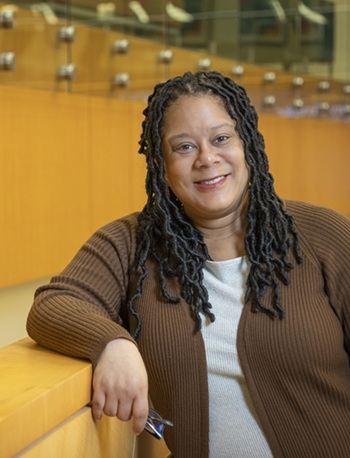
For Professor Kali Murray, democracy works best when it has a rich “toolbox” of practices that keep people connected, curious, and engaged. She sees democracy not only in the halls of government but also in the life of our public institutions—universities, churches, companies, clubs, even sports teams. Wherever people come together to create, question, and share ideas, democracy thrives.
Within this vision, she believes that intellectual property law plays a surprisingly democratic role. It’s not just about patents or copyrights—it’s about encouraging creativity and innovation while keeping knowledge accessible to everyone. “Books, inventions, art, and ideas all belong in the public conversation,” she explains. “That’s what keeps a democracy alive.”
Professor Murray’s research explores how intellectual property law has evolved to support that goal. Before the U.S. Constitution, rewards for innovation were granted by kings and queens. America’s founders changed that system by requiring true creativity and invention before granting exclusive rights—linking innovation to participation. Her work often examines how those principles intersect with issues of free speech, equality, and progress.
She has brought those ideas into practice, contributing to amicus briefs with the ACLU that challenged the patenting of genetic material—a reminder that patent law can touch on profound questions of human dignity and access to knowledge.
Professor Murray’s scholarship also shines a light on the social and historical layers of intellectual property. She’s written about how 19th-century Populists opposed patent monopolies and how trademark law still carries echoes of racial and cultural inequality. Her recent essay, “Seeing the Dead: Marks, Meaning, and the Haunting of American Trademark Law” (Texas Law Review, 2025), explores how memory and history shape modern branding and identity.
Her curiosity doesn’t stop at theory. She loves showing students how democracy depends on the quieter, everyday workings of law—like the administrative agencies that keep things running behind the scenes. Her current article project, Infrostructure(s): The Great (W)reckoning, examines how government structures and public access to information influence today’s politics and society. “Read your enacting statute once or twice a year,” she tells students. “You’ll see it differently every time.”
For Professor Murray, nothing compares to seeing creativity take flight. “I love watching inventors get a patent because they care so deeply about their work,” she says. “Patent specifications are like windows into human imagination.”
Whether she’s mentoring students, advancing Marquette’s Intellectual Property Law Program, or championing equality, inclusion and innovation, Professor Murray makes law feel deeply human—reminding us that democracy flourishes through shared ideas, open access, and the courage to create.
Before entering academia, Professor Murray practiced as a patent litigator at Venable LLP in Washington, D.C., focusing on pharmaceutical patent cases, and served as a federal judicial clerk for the Honorable Catherine C. Blake of the U.S. District Court for the Northern District of Maryland. A summa cum laude graduate of Johns Hopkins University with both B.A. and M.A. degrees in History, she earned her J.D. from Duke University School of Law, where she served as Spring Symposium Editor for the Duke Environmental Law and Policy Forum.
At Marquette, Professor Murray brings her blend of practical experience and scholarly insight to courses in Property Law, International Intellectual Property Law, Administrative Law, Trusts and Estates, and Property and Social Identity.

